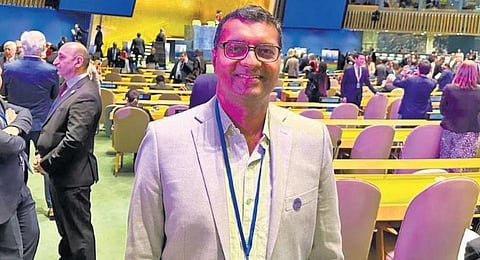

MAHARASHTRA: A few years ago, a group of friends got together to start movement on water
conservation. Their mission was creating 500-crore litre water storage in small hamlets of drought-prone North Maharashtra. Under this mission, 450-crore litre of water reservoir has been creaed in 80 villages in nine districts.
The mission has now won recognition at United Nations. ‘Mission 500-crore Litre Water Storage’ was started by Ujjwa Kumar Chavan, an IRS officer of 2010 batch, in 70 villages in Chalisgaon tehsil of Jalgaon district.
His friends who work in government joined him soon. They spare their holidays to make awareness about water conservation and carry out the mission of creating 500-crore litre water storage.In the past, villages were self-sufficient and sustainable for water management. Before the arrival of the British in India, the head of village planning was called Patil. Hence, the volunteers, who take charge of five villages in the mission are called ‘Paach Patil’ in this movement.
21 such ‘Pach Patils’ have been working in nine districts of Maharashtra for the last six years. Their work motivated people and created awareness among the people who meet diesel expenses for JCB and Poclain Machine for de-siltation and creation of check dams.
They follow the ‘Johad Pattern’ model that was previously implemented by Rajendra Singh in Rajasthan. The model is being implemented in drought and flood-prone areas across the world. Chavan said, “It is a big honour that our mission – the 500 crore litre movement –was appreciated on a global platform. We got an opportunity to participate in the four-day United Nations Conference in New York.”
The movement was started in Dhamangaon, a small hamlet, in Maharashtra in 2017. The mission works on the principle of ‘Put the Diesel and Use the Machine’ for constructing small check dams and water bodies. Through people’s participation and planning in the Gram Sabha, deepening and widening of river is done to construct dams and ponds in village areas. “So far, under this Mission, 450 crore liters of water reservoir has been created in 80 villages of nine districts. Besides, the 30 km of farm roads have been repaired and 45000 trees have been planted,” said Shrikant Paygavhane, one of the Pach Patils.
Paygavhane, an engineer with Brihanmumbai Municipal Corporation, spends his weekend and every possible holiday travelling around 350 km one way to carry forward the mission. “The objective of the mission is to use global experiences for local actions to mitigate droughts as well as flood in rural areas in Maharashtra. The ‘Mission 500-crore litre Water Storage’ created water reservoirs in villages in a decentralised manner at very low cost. It is a model of ‘Community-based Decentralised Water Management System’ in which people are empowered to construct water bodies in their village, conserve it, maintain it and raise the ground water level,” Paygavhane said.
“A dialogue, ‘Drought and Flood: Indigenous Innovations for Mitigation, Adaptation and Resilience’, was held at New Jersey. I participated in the dialogue and put forth our Pach Patil concept and ‘Mission 500’. There was discussion about finding a sustainable, indigenous and local solution to the problem of climate change, drought and flood at the global level. At the end of the dialogue, to rejuvenate the global water cycle, the delegation agreed on a world water pledge, which was later submitted to the United Nations,” Paygavhane said.
“Rejuvenation is a paradigm shift in thought and practice that goes beyond the dominant human centric worldview. We encourage 10 key shifts that mainly from narrow to all-encompassing concepts, terms and frameworks that cover all stages of the water cycle, from data and information to wisdom, weaving indigenous knowledge systems with modern science, art and technology, from formal education systems to living knowledge that energizes youth and from wasteful abuse to judicious circulation and guardianship of waters,” Chavan said.
“Africa, North and South America, Europe and Asia are facing the problem of drought and flood because of climate change. Climate change is caused by the energy sector, but its effects are manifested in the water sector. Water conservation is essential for mitigation and adaptation to climate change,” Paygavhane said.